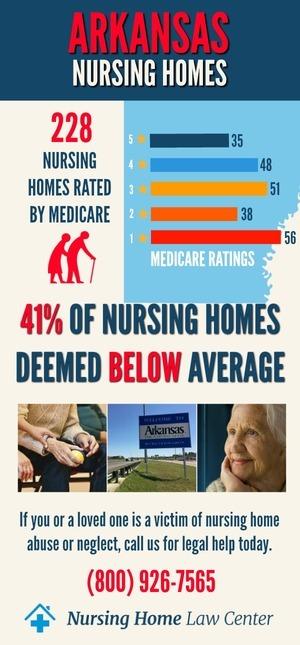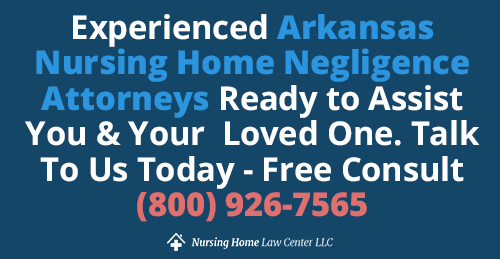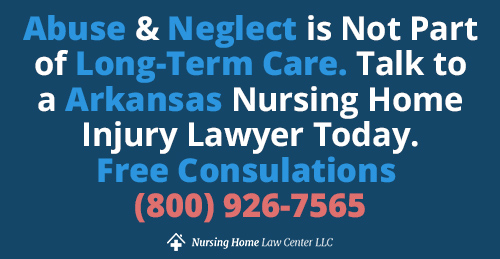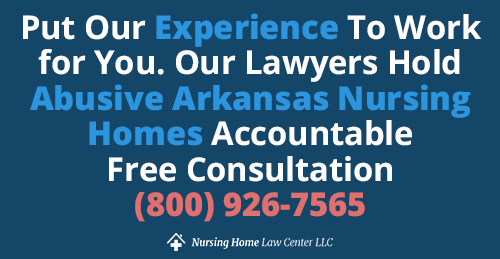The Nursing Home Law Center is committed to providing the legal resources necessary to hold negligent facilities accountable.
Arkansas Nursing Home Abuse Lawyer
Nursing home abuse is a heartbreaking reality for many vulnerable residents of long-term care facilities. Families entrust these facilities with the health and well-being of their loved ones, expecting them to receive the utmost care. Unfortunately, cases of elder abuse happen far too often, leaving victims and their families devastated.
Nursing Home Law Center is dedicated to holding negligent facilities accountable and seeking justice for those who have been harmed.
Why Hire Nursing Home Law Center

Licensed in Arkansas
At Nursing Home Law Center, our priority is to ensure justice and compensation for those affected by nursing home abuse. Our skilled legal team has extensive experience managing abuse cases with care and achieving substantial settlements and verdicts.
We carry out comprehensive investigations, making sure that every aspect of abuse—such as medical costs, emotional suffering, and other damages—is thoroughly addressed. With our strong knowledge of nursing home abuse claims, we handle the legal process efficiently and work relentlessly to safeguard your rights.
Throughout your case, we offer free consultations, compassionate guidance, and clear communication, ensuring that you and your loved ones are well-informed, supported, and confident at every stage.
Types of Cases Handled by Our Arkansas Nursing Home Abuse Lawyers
Nursing home abuse refers to the mistreatment of residents in long-term care facilities, which can cause physical, emotional, or financial harm. At Nursing Home Law Center, we handle a wide range of abuse cases, helping victims and their families seek justice and compensation.
Wrongful Death: In the most tragic cases, elder abuse or neglect can result in the wrongful death of a resident. Whether due to severe neglect, medical malpractice, or intentional harm, losing a family member in such circumstances is devastating. Family members may pursue a wrongful death claim to seek financial compensation for funeral costs, medical bills, and the emotional toll of the loss.
Physical Abuse: Physical abuse involves the intentional infliction of harm on a nursing home resident. This can include hitting, pushing, or slapping, and even the misuse of restraints. For example, a caregiver using unnecessary restraints to control a resident can cause serious injuries such as bruises or broken bones. Signs of physical abuse often include unexplained injuries and fear of staff members.
Mental and Emotional Abuse: Mental and emotional abuse occurs when a resident is subjected to verbal threats, insults, or isolation, causing emotional distress. For instance, a caregiver may belittle a resident, leading to depression or anxiety. Emotional and psychological abuse can be harder to detect, but changes in behavior, withdrawal, or anxiety are often key indicators.
Sexual Abuse: Sexual abuse refers to any non-consensual sexual contact with a resident. This can involve staff members, caregivers, or even other residents. Victims of sexual abuse may show physical signs like bruising or bleeding, or they may experience emotional trauma, including fear or withdrawal from others.
Medical Malpractice: Medical malpractice in nursing homes includes instances where residents receive improper or negligent medical care. Examples include the development of bedsores (pressure sores) due to a lack of mobility assistance or medication errors that result in serious health complications. Failing to provide proper medical care can lead to severe injuries or even death.
Negligence: Negligence involves the failure to provide basic care to a nursing home resident, resulting in harm. Examples of negligence include poor hygiene, malnutrition, dehydration, and elopement (when a resident wanders away from the facility unsupervised). Negligence can cause serious health issues and deterioration in the resident’s well-being.
Financial Abuse: Financial exploitation occurs when a caregiver or staff member exploits a resident’s finances for personal gain. This can include stealing money, forging checks, or taking control of the resident’s bank accounts without permission. Family members should be on the lookout for unusual changes in their loved one’s financial situation.
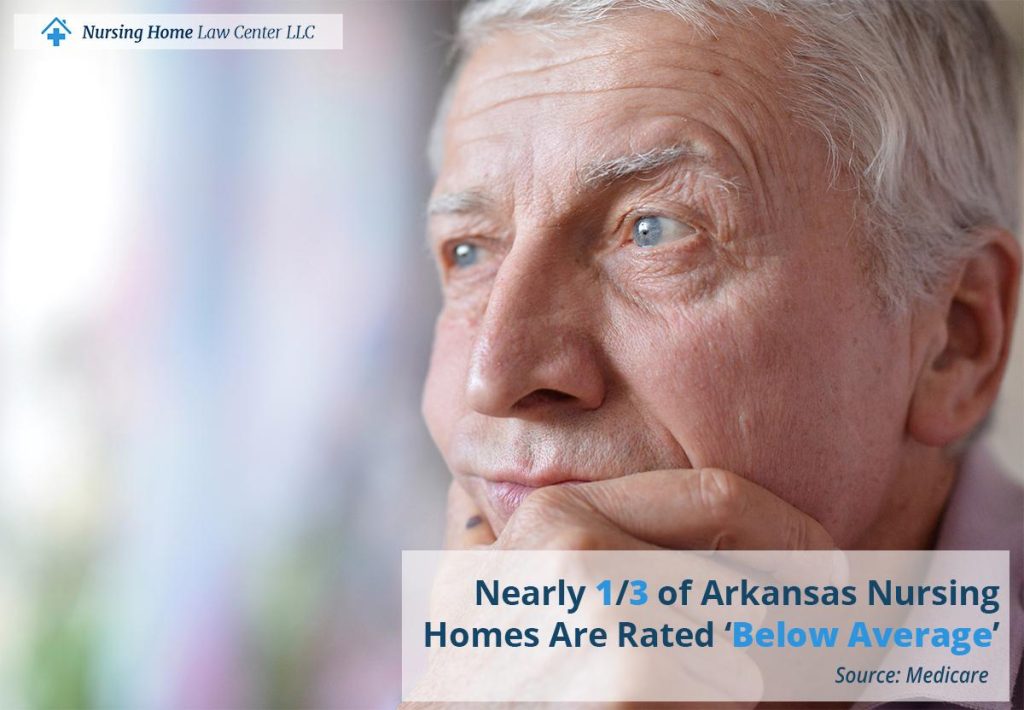
Understanding Your Legal Rights
Nursing home residents have legal rights protected under both federal and state laws. The Nursing Home Reform Act of 1987 sets national standards for nursing homes to ensure residents are treated with dignity and receive proper care. This act requires care facilities to provide a safe environment free from abuse and neglect.
In Arkansas, state-specific regulations further safeguard nursing home residents. Arkansas nursing home abuse laws ensure that residents receive appropriate health care and are protected from any form of abuse. Residents and their family members have the right to take legal action when these rights are violated. Legal advocacy is particularly vital in the state capital, where many large-scale facilities operate. If you suspect mistreatment in a Central Arkansas facility, a Little Rock Nursing Home Abuse Lawyer can provide the necessary guidance to navigate state regulations and file a formal claim against the responsible parties.
In Arkansas, both the victims of nursing home negligence and their family members may file a claim. Family members can act on behalf of a loved one who is incapacitated, deceased, or otherwise unable to file a nursing home abuse lawsuit themselves.
Liability in Nursing Home Neglect and Abuse Cases
In elder abuse and neglect cases, multiple parties can be held responsible for the harm caused to residents. This is because abusive or negligent behavior can stem from various individuals or entities within the care facility. Identifying liability requires a deep understanding of local facility management and corporate structures. For families in Northwest Arkansas, consulting with a Fayetteville Nursing Home Abuse Lawyer ensures that every potential party, from staff members to corporate owners, is thoroughly investigated for their role in the resident’s harm.
Third-Party Contractors: In nursing homes where certain services, such as medical care or security, are outsourced to third-party contractors, those entities may be liable if their negligence contributes to the abuse or neglect of a resident. Identifying liability requires a deep understanding of local facility management and corporate structures.
Nursing Home Staff: Caregivers or employees who directly engage in physical, emotional, or sexual abuse can be held personally liable for their actions. For instance, if a staff member uses excessive force or neglects a resident’s basic needs, they may face legal consequences.
Nursing Home Administrators and Management: The facility’s administration can be held accountable if they fail to properly screen, train, or supervise staff. Additionally, poor management decisions that lead to understaffing or unsafe conditions may contribute to nursing home neglect or abuse. If a resident develops bed sores due to insufficient care or malnutrition because of understaffing, the facility may be liable.
Other Residents: In some cases, one resident may harm another. Nursing homes are responsible for ensuring a safe environment, and if they fail to prevent or address resident-on-resident abuse, they may be held accountable for the harm caused.
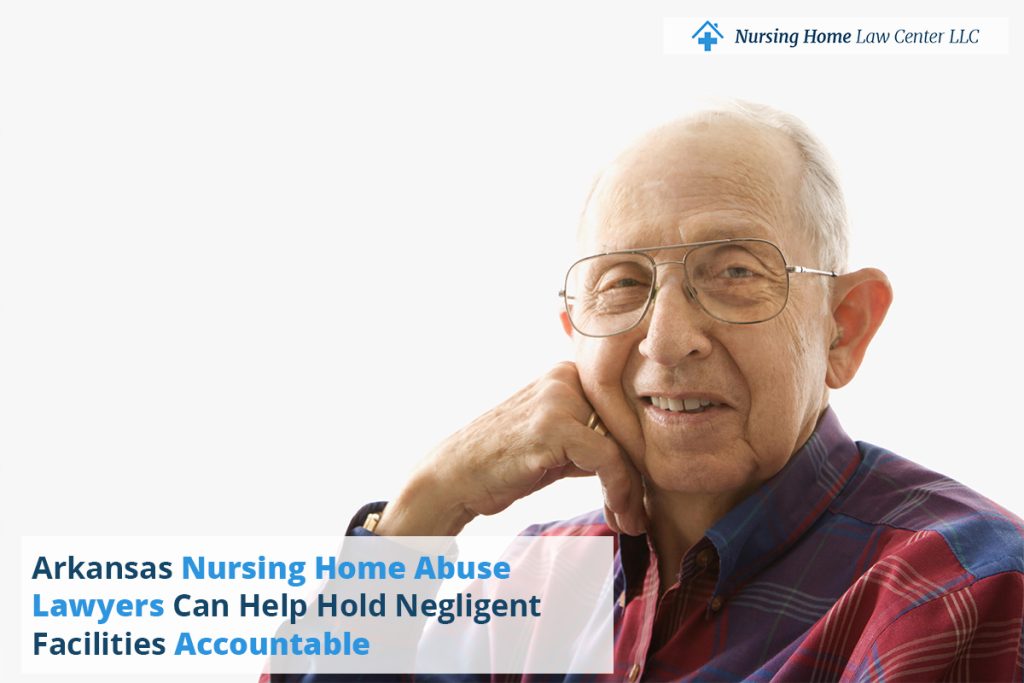
How Our Arkansas Nursing Home Abuse Attorneys Can Help
With years of experience in handling nursing home abuse cases, our law firm provides compassionate and effective legal representation. We are committed to obtaining justice for victims and their families. Here’s how we can assist:
- Free Consultation: We offer a free initial consultation to review the details of your case and discuss your legal options. This evaluation will help you understand your rights and determine the best course of action.
- Case Investigation: Our nursing home abuse attorneys conduct thorough investigations to uncover the truth behind the abuse. We gather evidence, interview witnesses, and review medical records to build a strong case for our clients. Protecting the elderly in Sebastian County requires more than just standard legal advice; it demands a deep commitment to investigating the specific conditions of local facilities. If you suspect that your family member has been a victim of mistreatment in the River Valley, a Fort Smith Nursing Home Abuse Lawyer can provide the localized support and aggressive representation needed to challenge negligent nursing home management and secure the compensation your loved one deserves.
- Filing the Claim: Once the necessary information is collected, we will file a nursing home abuse claim on your behalf. We ensure that it is filed within Arkansas’s statute of limitations, preserving your right to seek compensation.
- Settlement Negotiation: Many nursing home claims involving neglect or abuse are resolved through settlement negotiations. Our attorneys are skilled negotiators who will work to secure the maximum financial compensation for your case, whether through a settlement or trial.
- Trial if Needed: If a fair settlement cannot be reached, our legal team is prepared to take your case to trial. We will present your case in court and fight aggressively to secure justice for your family member.
Common Signs of Nursing Home Negligence and Abuse
In Arkansas, there are 220 Medicare-certified nursing facilities, with 84 facilities (38.2%) rated below or much below average overall. When looking specifically at health inspections, 91 homes (41.4%) fall short, and 74 homes (33.6%) have inadequate staffing levels. 48 facilities (21.8%) are rated poorly in quality measures. [1]These high rates of underperformance are a major concern for the growing populations in Washington and Benton Counties. Residents in these areas should seek help from a Springdale Nursing Home Abuse Lawyer to evaluate the safety records of local homes and take action if a facility has failed to meet staffing requirements.
The worst-rated nursing homes in Arkansas include:
| Arkansas Veterans Home at Fayetteville | Ashley Rehabilitation and Health Care Center |
| Barnes Healthcare | Chapel Woods Health and Rehabilitation |
| Cottage Lane Health and Rehab of Little Rock | Covington Court Health and Rehabilitation Center |
| Crestpark Stuttgart, LLC | Dewitt Nursing Home |
| Fayetteville Health and Rehabilitation Center | Heartland Rehabilitation and Care Center |
| Legacy Health and Rehabilitation Center | Meadowview Healthcare and Rehab |
| Oak Ridge Health and Rehabilitation | Paris Health and Rehabilitation Center |
| Piggott Healthcare & Senior Living, LLC | Ridgecrest Health and Rehabilitation |
| Springdale Health and Rehabilitation Center | St Andrews Healthcare |
| The Blossoms at Berryville Rehab & Nursing Center | The Blossoms at Cumberland Rehab & Nursing Center |
| The Blossoms at Newport Rehab & Nursing Center | The Blossoms at Van Buren Rehab and Nursing Center |
| The Blossoms at White Hall Rehab & Nursing Center | The Green House Cottages of Poplar Grove |
| The Springs Broadway | The Springs Magnolia |
| The Springs of Pinnacle Mountain | The Springs Searcy |
| The Villages of General Baptist Health Care West | Three Rivers Health and Rehabilitation Center |
| Trinity Village Medical Center | Woodland Hills Healthcare and Rehabilitation |
Recognizing the signs of elder abuse is essential in protecting your loved ones. While some symptoms may be subtle, it’s crucial to stay vigilant. Some common signs include:
- Unexplained injuries: Bruises, cuts, fractures, or unexplained injuries like burns may indicate physical abuse. For example, if a resident frequently appears with bruises and staff cannot provide a reasonable explanation, it may be a red flag.
- Sudden behavioral changes: Emotional abuse can manifest through withdrawal, depression, or anxiety. A resident who becomes unusually quiet, fearful, or refuses to engage in activities may be experiencing emotional harm.
- Fear of specific staff members: If a resident becomes visibly anxious or upset in the presence of certain caregivers, it may indicate that they are suffering verbal threats, humiliation, or other forms of mental abuse.
- Sudden avoidance of physical contact: Victims of sexual abuse may become fearful of touch or display significant distress when approached.
- Bed sores (pressure sores): Bed sores are often a sign of neglect, as they develop when a resident is left in the same position for too long without proper care or mobility assistance.
- Medication errors: Missed or incorrect medication doses can lead to serious health problems. If a resident’s health declines suddenly without explanation, it may be due to medication errors or neglect in administering treatment.
- Poor hygiene: Signs of poor hygiene, such as unwashed hair, body odor, or soiled clothing, can indicate that the facility is neglecting the resident’s basic needs.
- Malnutrition and dehydration: Unexplained weight loss, frequent thirst, or dry skin may suggest that the resident is not receiving adequate food and water.
- Unexplained financial transactions: Financial abuse may involve unauthorized withdrawals from bank accounts, missing valuables, or sudden changes to wills or financial documents. If your loved one’s finances appear to be in disarray, it may indicate exploitation.

What to Do If You Suspect Abuse or Neglect in a Nursing Home
If you suspect your loved one is being abused in a care facility, it’s essential to take immediate action:
- Call 911 if there is immediate danger: If you suspect your loved one is in immediate harm or is suffering from a medical emergency, call emergency services right away to secure their safety and get medical help.
- Report the abuse to the nursing home administrator or management: Inform the facility’s administration of your concerns and request that they investigate the situation immediately. Be sure to document your interactions with the management, including the date and time of the report and the response you receive.
- File a complaint with your local Ombudsman’s office: Your local Ombudsman is a government-appointed advocate for care facility residents. They have the authority to investigate complaints of abuse or neglect and help resolve issues. Filing a formal complaint with the Ombudsman can trigger an investigation and ensure that the abuse is properly addressed.
- Contact a nursing home abuse lawyer: Consulting an experienced nursing home abuse lawyer is essential for pursuing justice and compensation. An attorney will guide you through the legal process, help gather evidence, and file a nursing home abuse lawsuit if necessary.
Damages You Can Recover Through a Nursing Home Negligence Claim
Victims of nursing home neglect and their families may be entitled to recover various types of damages.
Economic Damages
Economic damages are quantifiable losses that can be calculated based on the financial impact of the abuse. Calculating these damages correctly is essential for ensuring the long-term care of a victim in Northeast Arkansas. By working with a Jonesboro Nursing Home Abuse Lawyer, you can accurately assess medical expenses and emotional trauma to pursue the maximum compensation available under state law. Examples include:
- Medical Expenses: Victims may incur medical costs related to the treatment of injuries sustained from abuse, such as hospital stays, medication, physical therapy, or rehabilitation.
- Relocation Costs: If a resident needs to be transferred to a safer facility, the cost of moving and securing new care may be recoverable.
- Funeral and Burial Costs: In the unfortunate event of wrongful death, families may seek financial compensation for funeral and burial expenses.
- Financial Losses from Exploitation: In cases of financial exploitation, victims may recover stolen money, assets, or compensation for unauthorized transactions involving their bank accounts or other financial resources.
Non-Economic Damages
Non-economic damages address the emotional and psychological suffering experienced by the victim and their family. Although harder to quantify, they are equally important in seeking full compensation. Examples include:
- Pain and Suffering: Victims of nursing home negligence may endure significant physical pain and emotional trauma, for which they are entitled to compensation.
- Emotional Distress: Mental and emotional abuse can leave long-lasting scars, such as depression, anxiety, or post-traumatic stress. Compensation for emotional distress addresses these intangible losses.
- Loss of Enjoyment of Life: When nursing home residents suffer abuse that diminishes their ability to enjoy everyday activities or maintain social relationships, compensation for loss of enjoyment of life may be sought.
- Loss of Companionship: In wrongful death cases, surviving family members may seek compensation for the loss of companionship, love, and support from their deceased loved one.
Punitive Damages
Punitive damages, unlike compensatory damages, are meant to serve as a deterrent, preventing similar misconduct in the future. In nursing home abuse cases, punitive damages may be awarded if the facility or its staff acted with willful misconduct, fraud, or gross negligence.
For example, if a nursing home deliberately ignores the safety and well-being of its residents, resulting in severe harm or death, the court may impose punitive damages as an additional penalty.
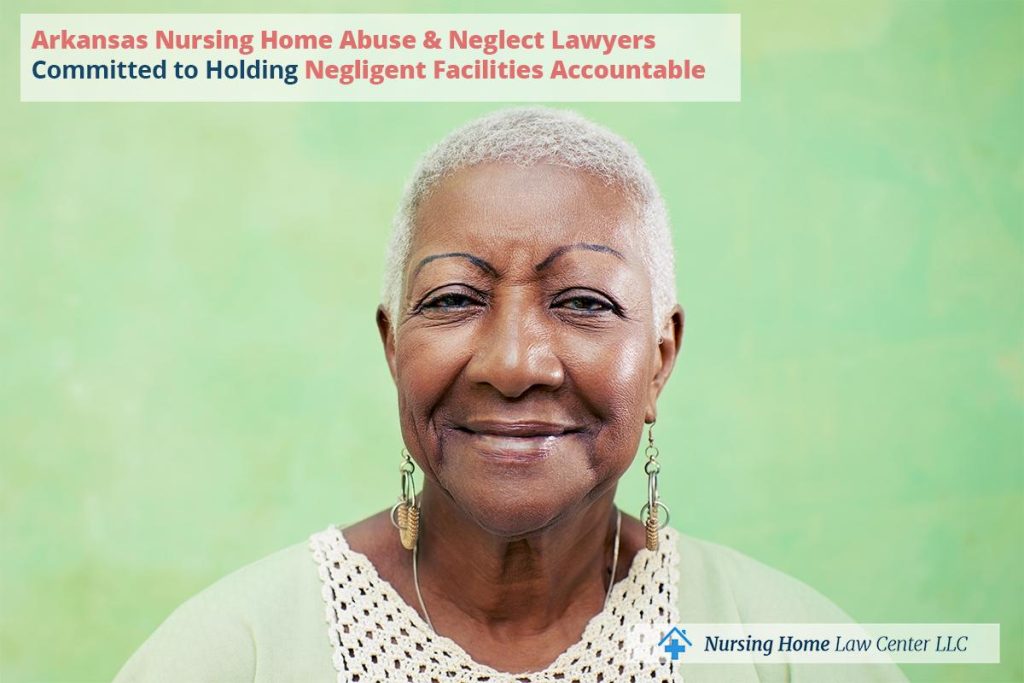
The Cost of Hiring an Arkansas Nursing Home Abuse Lawyer
Our law firm operates on a contingency basis, meaning you won’t pay any legal fees unless we win your case. This allows you to pursue justice without worrying about the cost of legal representation.
You Have Limited Time to Take Legal Action in Arkansas
Arkansas law imposes a statute of limitations on nursing home abuse cases. In most cases, you have three years from the date of the abuse to file a lawsuit. However, there are exceptions to this rule, and it’s essential to consult a nursing home abuse lawyer as soon as possible to protect your rights. Because evidence can disappear quickly, starting the legal process immediately is critical for cases in Southeast Arkansas. Contacting a Pine Bluff Nursing Home Abuse Lawyer as soon as you suspect harm will help ensure your case is filed before the legal deadline expires.
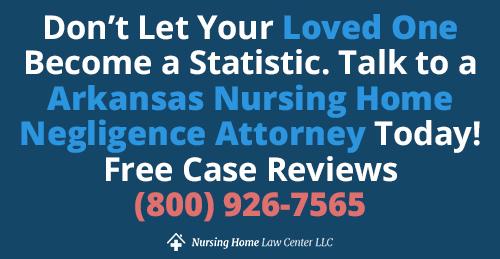
Contact an Arkansas Nursing Home Abuse Attorney Today!
If your loved one has suffered abuse or neglect in an Arkansas care facility, you don’t have to face this battle alone. The experienced nursing home abuse lawyers at Nursing Home Law Center are here to help you seek justice and recover the compensation your family deserves.
Call us at (800) 926-7565, or fill out our contact form to book a free consultation..
References: [1] Medicare
Arkansas Nursing Home Abuse Lawyers
Arkansas nursing home abuse lawyers are committed to fighting for families across the state. Whether you’re in Fayetteville, Fort Smith, Jonesboro, Little Rock, Pine Bluff, or Springdale, our experienced legal team is here to help you hold negligent nursing homes accountable. Contact a lawyer in Arkansas today to get the justice your loved one deserves.


